You can now add Healthify as a preferred source on Google. Click here to see us when you search Google.
Remembering to take your medicine
Key points about remembering to take your medicines
- Remembering to take your medicines regularly and at the correct time isn't always easy, but taking your medicines as prescribed is critical for your health.
-
Here are some tips to help you remember to take each medicine at the right time.
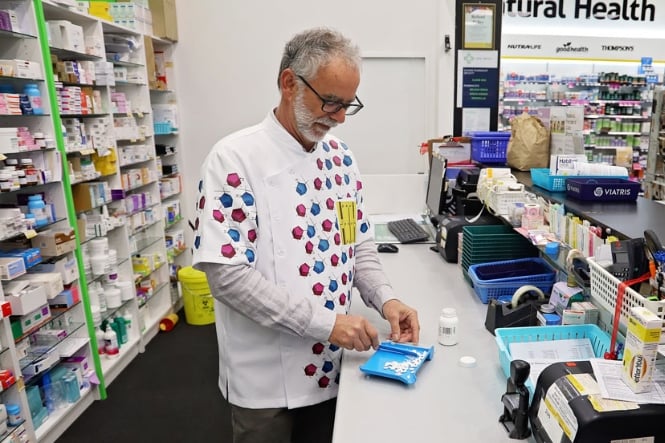
If you've just been prescribed a medicine, it can take some time to get used to remembering to take it. But equally, if you've been taking medicines for a while, it can become so routine that you may forget whether you've taken your dose or not.
Get advice on your medicine schedule
If you find your medicine schedule difficult, ask your doctor or pharmacist what to do. There may be ways to simplify when you take your medicines and some medicines may be able to be taken together with others. Always check with your healthcare provider if you’re unsure.
Know what to do if you miss a dose
When you start a new medicine, ask your pharmacist what to do if you miss a dose. For most medicines, you can take your next dose at the usual time. Don’t double the dose or take any more than you've been prescribed.
There are some medicines where a missed dose can be a problem and you should contact your pharmacist for advice on what to do. Examples of these include:
- the combined oral contraceptive pill(external link) and the mini-pill(external link) – if you miss a dose, you may be at risk of becoming pregnant
- epilepsy medicines(external link)
- warfarin(external link)
- insulin(external link)
- clozapine(external link)
- methotrexate(external link) (if taken once weekly)
- medicines for cancer
- medicines to prevent rejection of a transplant.
Have a plan for when you go away
If you change your regular routine, you may forget to take your medicines, eg, if you're on holiday. Make sure that if you’re going to be somewhere different, you have a plan for how you’ll remind yourself to take your medicine.
Try some of the following ideas to help you remember to take your medicines and track when you’ve taken them.
Find a method that works for you and stick with it. The tools you use to help you may need to change if you’re prescribed more medicines, your memory is not as good as it used to be or if you take a medicine with a complicated schedule.
Video: 8 tricks for remembering your meds
(Mayo clinic, USA, 2017)
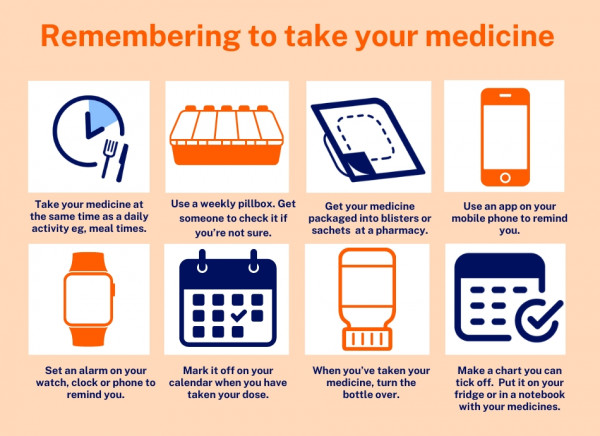
Image credit: Healthify He Puna Waiora
Take doses with a daily habit
Make a habit or routine of taking your medicine by taking your doses at the same time as a daily activity that you already have eg, meal times, when you brush your teeth or when you get into bed.
Keep your medicines in a secure place where they can be easily seen as a visual reminder. Soon your medicines will become routine, just like brushing your teeth.
If your medicine needs to be stored in the fridge, a sticky note on the fridge door could be a reminder.
Use a weekly pillbox
Pharmacies and supermarkets sell plastic pillboxes labelled with the days of the week. If you take medicines at different times of the day you can get pillboxes that have labels for different times of the day eg, morning, noon, and evening. To help you keep track, fill the pillbox at the beginning of the week. If you're unsure, you can ask a family member, friend or your healthcare provider to check that you've put your pills in correctly. Some pharmacies will fill your pillboxes for you.
Ask for compliance packaging from your pharmacy
Many pharmacies offer a compliance packaging service where your medicines can be packaged into blister packs or rolls of sachets.
Blister packs
A blister pack has rows of plastic blisters that have the capsules or tablets in and has a foil backing. The back of the foil lists the medicine names and the dose. The front of the pack has the day of the week down the side and the time to take the medicines in each blister along the top, eg, breakfast, lunch, dinner or bedtime.
Blister packs are available as weekly or monthly packs – ask your pharmacist which is best for you. With some blister packs you can tear off a strip of blisters for a day or a single dose. This makes the medicine more easy to carry around with you if you're planning on being away from home for a few hours or the day.
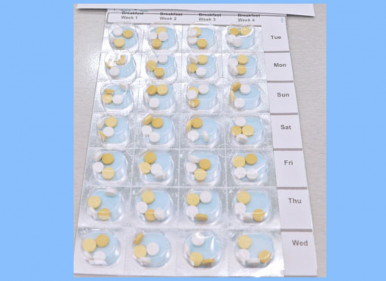
Image credit: Healthify He Puna Waiora
Sachet rolls
Some pharmacies offer sachet rolls, where your tablets or capsules are packed into small sachets. Each sachet is labelled with the date and time it should be taken with a list of the medicines inside the sachet. The sachets are in a roll in the order they're to be taken.
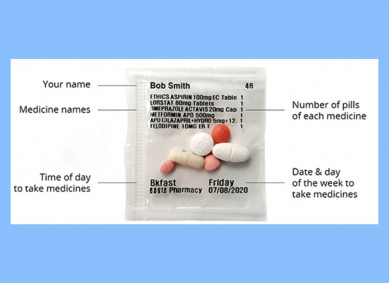
Image credit: Zoom Pharmacy
Use a medication reminder app
If you have a mobile phone, there are apps that can send you a reminder to take your medicines. Some will record when you've taken your dose. Read more about medication reminder apps(external link).
Set an alarm
Setting an alarm on your mobile phone, watch or clock to remind you that your medicines need to be taken at a certain time each day works well for some people.
Mark the calendar
Marking the date on a paper calendar once you've taken your medicines for that day can be helpful. If you need to take medicines 2 or 3 times in a day, you can put a tick or mark the date 2 or 3 times.
Marking the calendar may also be useful for medicines that need to be taken less regularly, eg, twice a week or once a month.
If you use a digital calendar on a device, setting a reminder on your digital calendar to notify you when a dose of medicine is due can be useful too.
Flip your bottle over
If you take a tablet once a day you can flip your bottle over when you've taken a dose to remind you it's been taken for that day. Just remember to flip it back over at the start or end of each day.
Make a chart
A chart can also be helpful to remember to take your medicines. You can make a chart in a notebook and keep it with your medicines or put the chart on your fridge or wall. The chart should include:
- the name of your medicine
- the dose to be taken
- the time of day you need to take it
- a space to mark when you have taken each dose of medicine.
Brochures
Taking your medicine safely(external link) Health Quality and Safety Commission NZ
Safe use of medicines – patient guide(external link) Waitematā DHB, NZ
5 questions to ask about your medications(external link) Health Quality and Safety Commission, NZ English(external link), te reo Māori(external link)
Apps/tools
Paracetamol dose calculator
Medication reminder apps
References
- I've missed a dose – what should I do?(external link) Medsafe, NZ, 2003
- Creative ways to remember to take your medicines(external link) Drugs.com, US, 2022
Brochures

Health Quality and Safety Commission NZ, 2018
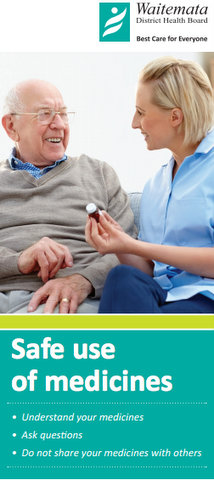

Waitematā DHB, NZ
Chinese, 2016
Korean, 2016
Credits: Healthify editorial team. Healthify is brought to you by Health Navigator Charitable Trust.
Reviewed by: Stephanie Yee, Pharmacist, Auckland
Last reviewed:





